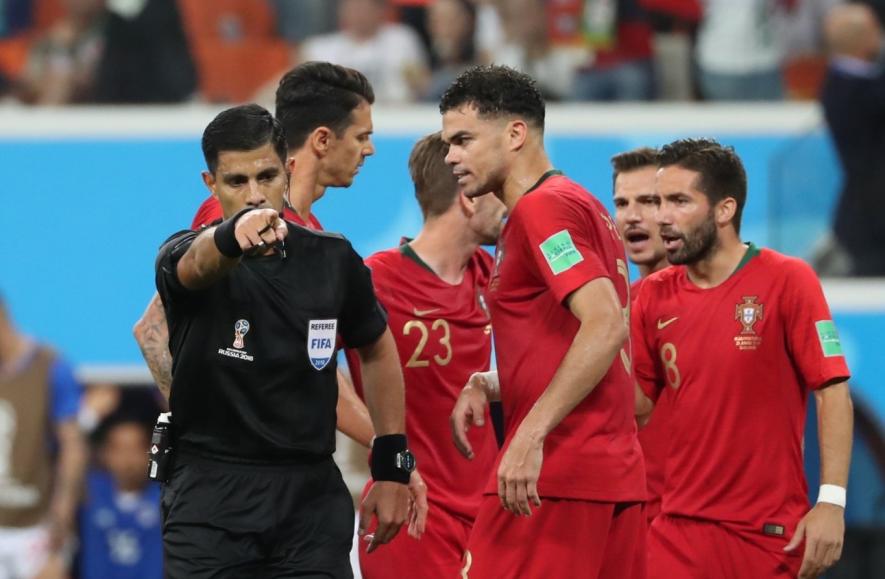Halfway through FIFA World Cup, Is VAR fighting a losing battle?

Most VAR interventions at the FIFA World Cup have centered around penalties -- a record total of 22 after Argentina vs Nigeria and Iceland vs Croatia group matches (Pix: IANS).
FIFA World Cup 2018 hit the midway mark with Colombia’s win over Poland in the final game of Group G on June 24. Half of the 30-day tournament’s 64 games were over, and with it came the depressing reminder that, by the end of July, a lot of people will be going back to work just a little bit sadder.
Until the Colombia-Poland clash, the Video Assistant Referee (VAR), this World Cup’s biggest innovation -- Neymar’s haircuts, although tempting, don’t qualify was being viewed as a success. Most video-referrals seemed to be commendable, and seemingly obvious as well. But the scales tipped the other way in just one day (within 90 minutes of two simultaneous games actually).
Most VAR interventions have centered around penalties. The tournament has already broken the record for most penalties at FIFA’s seminal event (22 after Argentina vs Nigeria and Iceland vs Croatia). And we are not out of the group stages yet.
READ MORE | VAR Inflicts Wounds on Iran, Portugal
The first of these was Josh Risdon’s tackle on Antoine Griezmann in France’s Group C opener. Despite the huge amount of debate surrounding it, it wasn’t an obvious error. There have been several correct calls on the way. Neymar against Costa Rica, Mohammed Salah vs Russia and Leon Balogun vs Argentina. But these are the obvious cases. There are many more that fall into a grey area -- the most obvious being Cristiano Ronaldo vs Iran and then Sardar Azmoun vs Cedric Soares in the same game.
And it is these decisions that have led to a volley of criticisms. Access to replays hasn’t made it clearer for referees to give decisions. If anything, it has muddled their brains. To take the most obvious case, Ronaldo’s yellow card-worthy elbow on Morteza Pouraliganji provoked, arguably, the most memorable quote of the World Cup so far. “I don't want to know if my daughter is a bit pregnant, only fully pregnant. VAR isn't going well, it's not working,” Iran’s coach Carlos Queiroz said. It is a brilliant way of saying the simple thing. VAR is supposed to make infringements black and white. It has only made things a bit greyer.
The human factor
The problem with the technology is simple. Humans handle it. Despite the availability of extensive replays, multiple views and handy earpieces, the fact is that referees are in charge of the decision-making process at the end of it. And referees are human.
READ MORE | Alireza Beiranvand: From a ‘beggar’ in Tehran to Stopping Cristiano Ronaldo at FIFA World Cup
As an analogy, think of the times you made a mistake adding two numbers. The mistake is made not because you don't know the correct way to add. If you didn't know how to add, no matter how many times you looked at the problem, you wouldn't know how to calculate the correct answer.
Now consider what happened in two roughly similar incidents in games on consecutive days. In the first, Iran’s Azmoun looked to have headed the ball against Soares’ arm, only for the referee to give a penalty. The decision seemed harsh considering the official had access to replays. If Soares had managed to get his arm out of the way in that position, perhaps he would do better as a gymnast than as a footballer. The second came yesterday, when Marcos Rojo did what only an Argentine defender can. He headed the ball on to his own arm. No penalty.
After the match, pundits across different broadcasts admitted that a penalty would have been a harsh decision in that situation. And they weren’t wrong. The truth is, a look at the rulebook would’ve ensured neither were penalties. One of the referees in these instances stayed calm and played the rules back in his head while looking at the replay. The other didn’t. Portugal suffered. Argentina profited.
Col Goutam Kar, Head of Referees in India, says it best: “At the end of the day, the power of decision lies in the hand of the referee. VAR can be considered a tool.”
Gut Instinct of referees
Kar’s argument follows a simple logic. It isn’t the technology that is problematic. He also admits though that some decisions have perhaps been affected by extensive replays when ‘spur of the moment’ call would have sufficed. “Especially when it comes to red cards, very often referees have to quickly go for the gut instinct,” he says. “The situation of the game, the history of the two players in the game, the banter, the aggression, these things a video cannot appropriately communicate.”
READ MORE | FIFA World Cup: Sweden Players Join Hands With Durmaz After Racist Abuse
It is in this regard that VAR has suffered the most criticism at the World Cup. A second look at an incident, instead of clearing up the referees’ doubts, sometimes just makes their decision-making more passive. The example of Ante Rebic’s studs-up challenge on Argentina’s Eduardo Salvio immediately comes to mind. It was a challenge that provoked flinching even for the TV viewer. In slow-motion though it looked like it lacked deliberation -- because slow-motion rarely makes anything looks deliberate.
The rules of the game are simple enough on this matter – point your studs and make contact with an opposition player, get sent off. By Kar’s formula too it would’ve been a red card. The duo had already been involved in a few clashes, and, minutes before this challenge, Rebic had been relieved of the ball quite unceremoniously by Salvio. One careful look at the replay though and the referee felt that Rebic had done enough to perhaps continue playing. His apologies no doubt played a part too. He went on to score the opener in their 3-0 victory.
One of the bigger problems with technology is the wording on how it’s meant to be used. ‘Clear and obvious errors’ in refereeing decisions never exist. In a social media world, every one has an opinion. And in big games with extreme chaos and high tension, the opinions only get more stubborn. Referees are supposed to calm the game. And sometimes they never manage to get in control of the play itself, let alone calm it.
The Iran vs Portugal game – the subject of perhaps the biggest VAR problems this World Cup – is a prime example. As Col Kar tells it. “In that game, with the level of aggression set from the first whistle, the referee (Enrique Cáceres) would have been best advised to warn a couple of players and get some cards out of the way early. It would have calmed things down, and asserted his authority.” He didn’t and let on the idea that he was weak minded. From their on, chaos reigned.
Get the latest reports & analysis with people's perspective on Protests, movements & deep analytical videos, discussions of the current affairs in your Telegram app. Subscribe to NewsClick's Telegram channel & get Real-Time updates on stories, as they get published on our website.
























